Review: The First Alert OneLink smart smoke & carbon monoxide detector is a more affordabl...
The second generation First Alert OneLink Smart Smoke and Carbon Monoxide detector helps keep you protected with remote notifications, HomeKit automation support, and a calm voice rather than an ear-piercing beep.
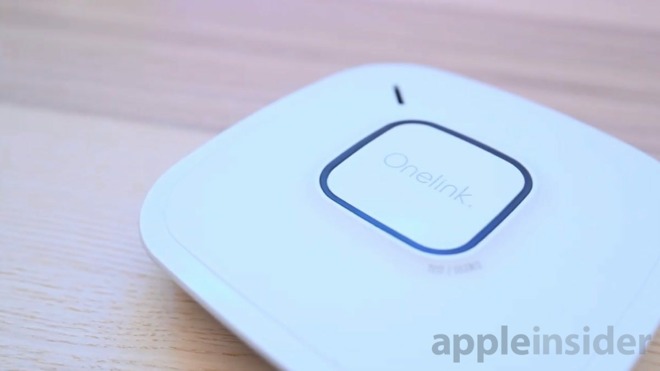
OneLink Smart Smoke and Carbon Monoxide Alarm
During the 2018 CES, First Alert debuted the smart and somewhat difficult to describe OneLink Safe and Sound. The OneLink Safe and Sound is a combo device that blends a smart speaker with an Internet connected carbon monoxide and smoke detector.
Now, less than a year later, and prior to CES, First Alert has released a compatible smart smoke and carbon monoxide alarm that lacks the music speaker. The new OneLink alarm is the second generation the device from First Alert, and works with the Safe and Sound.
Safe and Sound packs a substantial price tag, so outfitting your entire home with them is questionable for most, which makes the second generation product option a solid alternative.
Installation of the OneLink smart smoke and carbon monoxide alarm took us only a matter of minutes. It required us to remove our existing alarm -- a standard Kiddie model -- by twisting it off the base, loosening the two screws that held the base to the ceiling, then swapping it all for the included parts in the First Alert box.
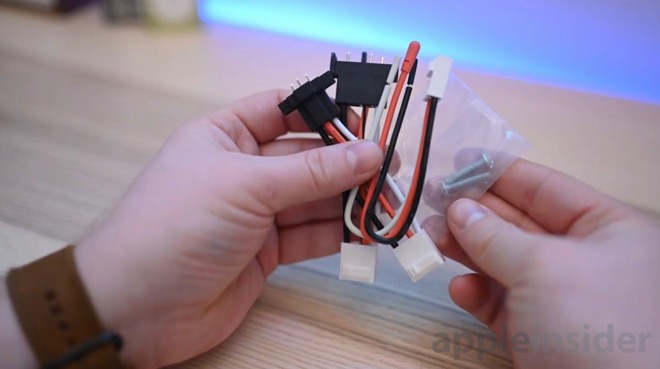
OneLink wiring components
First Alert has gone out of their way to make it easy by including a mounting plate that should fit any screws you were already using with several different tracks for the screws to slide into. They also threw in a trio of different cables -- two of which will hopefully work with your existing wiring by way of an adapter. If they don't you can wire it up yourself.
If you don't have a wired detector, fret not because a wireless version is also available.
As soon as you've got it wired up, it will promptly announce itself, and ask you to continue setup using the OneLink app.

OneLink Smart Smoke and Carbon Monoxide back panel
On the back, as well as on the side is your unique HomeKit paring code needed to complete the setup process. A third code is included in the manual so you don't have to climb back up the ladder if you ever need to re-add it to your Home.
The OneLink app guides you through the setup process of adding the device to your Wi-Fi network and HomeKit, and asks you to make a few choices such as which room it has been installed.
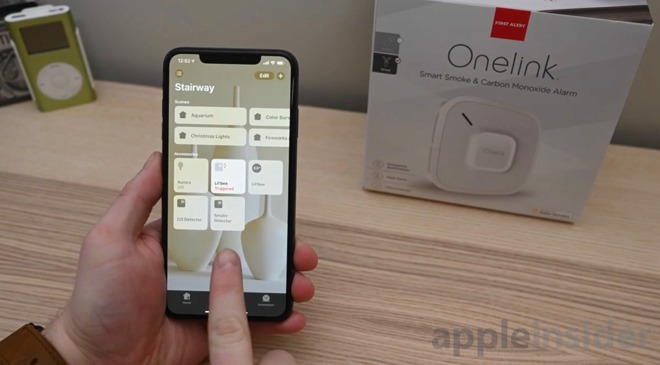
Smoke and CO sensors in the Home app
Like other multi-sensor HomeKit devices, two different devices will appear in the Home app after setup -- a carbon monoxide sensor and a smoke sensor.
Without going into all the details, rules and triggers can be set up around these sensors to better help you know when something is afoot. As an example, in our home, we turn on the lights whenever the detector senses smoke. That way if it is the middle of the night, we can see easier or be alerted quicker.
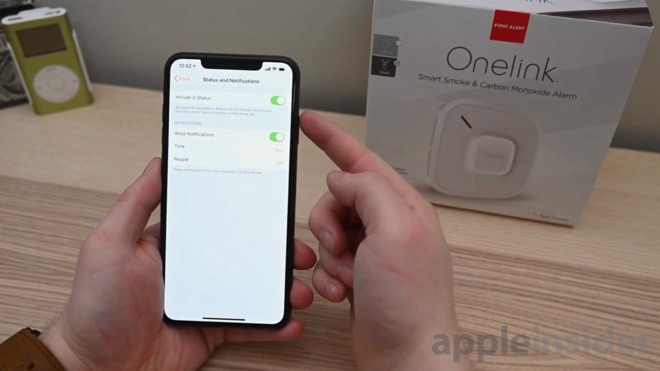
HomeKit notifications
HomeKit also lets you get notifications from the Home app should either sensor be tripped. This seems unnecessary as the OneLink app will already send you a notifications but it could be useful if you want to get the alerts on your Mac or iPad as well.
This is beneficial to make sure everyone in the home is properly alerted of an emergency. This cheaper alarm doesn't come equipped with a speaker for music playback but it does still give you voice alerts about what's happening.
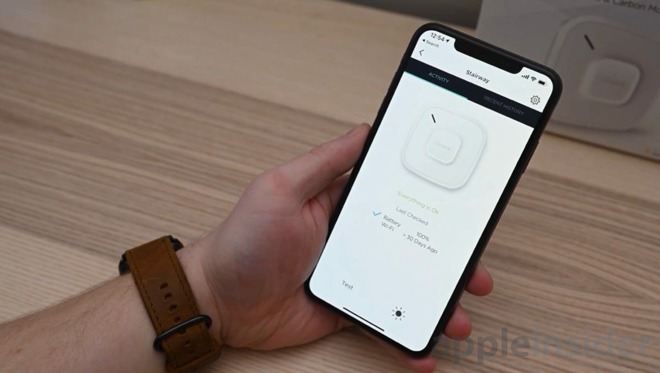
OneLink app
With multiple installed, if you're upstairs and a fire starts in the living room, instead of the alarm, the alarm will instead calmly tell you that smoke was detected downstairs. This informs you of the location of the issue, as well as what kind of sensor was tripped.
Other alarms offer the full-home alert, but it can be more useful to hear a voice and contextual information versus just a shrieking beep.
A hundred bucks can still be a bit hard to swallow when up against the $20-$30 non-smart alternative but the peace of mind offered could be worth it.
If you've been looking at the Safe and Sound, the proposition with the model lacking the music speaker is even better, with the standalone alarm offering many of the features at half the cost.

OneLink Smart Smoke and Carbon Monoxide Alarm
During the 2018 CES, First Alert debuted the smart and somewhat difficult to describe OneLink Safe and Sound. The OneLink Safe and Sound is a combo device that blends a smart speaker with an Internet connected carbon monoxide and smoke detector.
Now, less than a year later, and prior to CES, First Alert has released a compatible smart smoke and carbon monoxide alarm that lacks the music speaker. The new OneLink alarm is the second generation the device from First Alert, and works with the Safe and Sound.
Safe and Sound packs a substantial price tag, so outfitting your entire home with them is questionable for most, which makes the second generation product option a solid alternative.
The basics
The device is smaller than the Safe and Sound, but still more sizable than your average hardware store smoke detector. The square enclosure has rounded-off corners, and a LED-encircled button in the center to test the alarm, or press it five times to reset the device.Installation of the OneLink smart smoke and carbon monoxide alarm took us only a matter of minutes. It required us to remove our existing alarm -- a standard Kiddie model -- by twisting it off the base, loosening the two screws that held the base to the ceiling, then swapping it all for the included parts in the First Alert box.

OneLink wiring components
First Alert has gone out of their way to make it easy by including a mounting plate that should fit any screws you were already using with several different tracks for the screws to slide into. They also threw in a trio of different cables -- two of which will hopefully work with your existing wiring by way of an adapter. If they don't you can wire it up yourself.
If you don't have a wired detector, fret not because a wireless version is also available.
As soon as you've got it wired up, it will promptly announce itself, and ask you to continue setup using the OneLink app.
Smart home compatible
First Alert has built in compatibility with Apple's HomeKit and Amazon Alexa, though we are only really going to dig into the former.
OneLink Smart Smoke and Carbon Monoxide back panel
On the back, as well as on the side is your unique HomeKit paring code needed to complete the setup process. A third code is included in the manual so you don't have to climb back up the ladder if you ever need to re-add it to your Home.
The OneLink app guides you through the setup process of adding the device to your Wi-Fi network and HomeKit, and asks you to make a few choices such as which room it has been installed.

Smoke and CO sensors in the Home app
Like other multi-sensor HomeKit devices, two different devices will appear in the Home app after setup -- a carbon monoxide sensor and a smoke sensor.
Without going into all the details, rules and triggers can be set up around these sensors to better help you know when something is afoot. As an example, in our home, we turn on the lights whenever the detector senses smoke. That way if it is the middle of the night, we can see easier or be alerted quicker.

HomeKit notifications
HomeKit also lets you get notifications from the Home app should either sensor be tripped. This seems unnecessary as the OneLink app will already send you a notifications but it could be useful if you want to get the alerts on your Mac or iPad as well.
Working with the Safe and Sound
Whether you've got the OneLink Safe and Sound or just multiple of these smart smoke/CO alarms, there is a lot of inter connectivity between devices. First Alert uses Bluetooth to create a mesh network between the different First Alert products.This is beneficial to make sure everyone in the home is properly alerted of an emergency. This cheaper alarm doesn't come equipped with a speaker for music playback but it does still give you voice alerts about what's happening.

OneLink app
With multiple installed, if you're upstairs and a fire starts in the living room, instead of the alarm, the alarm will instead calmly tell you that smoke was detected downstairs. This informs you of the location of the issue, as well as what kind of sensor was tripped.
Other alarms offer the full-home alert, but it can be more useful to hear a voice and contextual information versus just a shrieking beep.
Keeping your home safe
As a sensor, there isn't much actively going on with the alarm. Sensors are inherently a bit boring to deal with, but they are vital to protecting your home, or increasing its capabilities as a smart home.A hundred bucks can still be a bit hard to swallow when up against the $20-$30 non-smart alternative but the peace of mind offered could be worth it.
If you've been looking at the Safe and Sound, the proposition with the model lacking the music speaker is even better, with the standalone alarm offering many of the features at half the cost.


Comments
Alexa mishears and thinks we are talking to her many, many times more often than we’ve ever had Siri ‘butt in”, but if you turn off the microphone, then the nightlight glows murder red rather than whatever color/level you’ve set it to and won’t change back as long as Alexa is turned off. Odd thing is first time I disabled the mic it momentarily showed a red glow to indicate mic was off, then went back to normal.
The app or firmware seem a little flaky. I also get errors polling some of the device details, even though I can set and change other things about the device, access the speaker, etc. Essentially I bought the 2x the price, same functionality (potentially more flaky though) plus a marginal quality manual Bluetooth speaker and a overly active microphone. Not sure I’d buy again, or even extend with the new model. I liked the concept.
The device has pretty poor recent reviews on Amazon, but this AI review doesn’t address the pairing process or any post-installation functionality.
the First Alert continually unsynched and stopped working all together and had to be replaced
Nest..... I kinda forgot I still had it , it just runs in the back ground and connects to all the other Nest Devices I have since purchased .
Nest is an Apple product brand that Apple let fall from its tree and has that same quality feel.
First Alert is a hardware company that hasn’t nailed the hardware or the Software yet
not something that belongs in the Apple Ecosystem and definately not protecting your home .
I think the only benefit is to be alerted of smoke or CO in the house while you are not in the house. Otherwise, you can't miss the audible alert. The feature of the upstairs smoke detector calmly telling you in a human voice that there's smoke downstairs is a gimmick. How is that different than simply blaring an alarm. I think you can figure out for yourself where smoke is if the upstairs smoke detector blares the alarm when the downstairs smoke detector detects the smoke. Even dumb smoke detectors alert one another of the detected smoke, and all of them start blaring the alarm as long as dumb smoke detectors are hard-wired to the residential smoke-detector wiring.
FirstAlert tried to integrate the speakers and the microphone in the previous version, and that didn't work too well. For one, I really would not want to have a microphone phoning everything I say home to Amazon. I think this is where I draw a line. One day we will find out how Amazon and Google have abused all the information they overheard from the devices that they planted in our houses like we are learning now about Facebook having abused the information that the users entrusted in it. Even with the Ecobee thermostats, I refuse to buy Ecobee 4 for the same reason: Alexa integration. I was fortunate to purchase Ecobee 3 before they were discontinued, but if I had to do it now, I would buy Ecobee 3 Lite, which lacks the motion sensor feature in it, but at least it doesn't have the microphone to phone home to Amazon.
So, the Alexa integration was not a good idea, but does it mean that the smart smoke detectors cannot have additional features? For example, why not have motion sensors built in to the smoke detectors? This would provide an inconspicuous way to alert of an intrusion via HomeKit. Some home security systems are now becoming HomeKit aware, so a third-party motion sensor may be capable of being integrated into a home security system. Maybe have a version of a smoke detector with a camera in it. Perhaps integrate a Wi-FI mesh Access Point into a smoke detector. For example, partner with one (or more) of the Wi-Fi mesh system manufacturers and make such a hybrid device. I think there are plenty of additional features that a smart smoke detector can assume to become worth it for the consumer compared to a dumb smoke detector. But for now, I think I'll pass.
Sometimes you're broiling something that creates enough smoke to cause the Nest detector to warn those in the home. It doesn't know why there's smoke, just that it's there. Having a human voice notify me is wonderful IMO, as it gives me time to turn on an exhaust fan on and clear it before the very loud smoke alarm is set off.
If the source of smoke is upstairs instead, which I might not notice if I'm in the kitchen cooking, having the downstairs one tell me it's upstairs is ABSOLUTELY a safety benefit. Same with the carbon-monoxide detection, particularly if you're upstairs. Not gimmicky at all. The benefit of an alert there's smoke /carbon monoxide in the house if I'm not home is a no-brainer of course.
and two big pluses for the Nest version:
One, they have built-in proximity detectors that turn on a nightlight when near them. If you hear/smell/suspect something having that night-light come on automatically is a useful safety feature.
Second and also the biggie: I use Nest cams and thermostats at home. If the Nest fire alarm does go off I'm also automatically sent an alert on my phone from the Nest cams that show me what's going on in my home, perhaps pinpointing where a fire might be. Exactly what I'd want if I'm away, and what you'd want too I suspect. To top it off Nest will automatically shut off the upstairs/downstairs A/C systems so as not to help feed the flames.
So no I don't see the features as gimmicky at all.
Apple doesn't really buy accessory brands so I dunno what people expected here. They bought Beats, but that was special for a few reasons -- Beats was the most popular accessory in Apple stores, their line was forecasted to bring in billions (it did), they had a streaming music service, and they had music industry moguls who could bring their deal-making to Apple. By contrast, what did Nest have? One niche product, spear-headed by a former Apple exec with rage issues that people don't like working for. Sounds great.
Great ideas, and I expect we will see more smart integration along those lines. I currently have a mundane Honeywell security system of some sort, but I don't know that they offer HK support in their product line yet. I checked once and it seemed like they had some fancy-schmancy smart-home system, which I'm not interested in.
But I disagree that smart smoke detections w/ notifications is a gimmick. I've never lived in a house that had residential smoke-detector wiring, as such every single one of my smoke detectors as been doing its own thing. If they could instead tell me regardless of where I am, could turn on all the lights, and shut off the furnace -- I don't see how that could be a bad thing.
Maybe Apple is the real hold-up rather than Google not wanting to offer it. In fact IMHO that's the more likely reason since most Google products outside of Nest are cross-platform. Nest is an outlier.
What benefit does Google gain from discouraging Apple users from purchasing the nicely-integrated, well-designed, and premium build products? None that I can think of and I bet you can't either. Apple users are just the type of buyer who would appreciate the otherwise very Apple-y products. Common sense kinda points to Apple being the reason Nest products aren't Homekit-compatible. Apple doesn't lose a cent, while Google is losing out on hardware profits.
Maybe I should buy these after all. The quality though bothers me. I’m afraid this device is just as badly made as the previous version.
Nest and Ring, however, are two companies that were purchased by major Apple competitors, Google and Amazon, and both companies absolutely are trying to do everything they can do keep Apple HK from being dominant as it ties into the world of assistants as well and other aspects of their respective ecosystems. That's why, no other reason, Ring was about to offer HK compatibility, but now just keeps saying it "may be" coming in a future product--for the past two years! The doorbell and camera market is a hot mess and cries out for Apple to produce a nicely designed top notch product that would likely immediately dominate the market. Google/Nest will likely never allow HK-- here's their quote to Apple Insider from early 2017, "a Nest spokesperson officially told us its “open to supporting” the platform and that it will indeed “consider HomeKit.” LOL.
I know you don't understand software & product development very well, but Apple does not bar product developers & designers from using HomeKit. If you have evidence to support this misdirection, please provide.
Google made their bed, and worse, did so in an anti-user way. It's the definition of corporate warfare, and it's entirely on them. No amount of apologist misdirection will change that. Me not being able to say exactly *why* they did so is irrelevant. It is the *fact* that they did so that matters. Tho if I were to hazard a guess I would agree with Notsofast that it's a calculated move to prevent HK from becoming the dominant home automation protocol, further cementing iOS dominance over Android, Alexa, etc etc. Not much of a stretch.
https://appleinsider.com/articles/16/07/22/why-alphabets-nest-doesnt-and-probably-wont-ever-support-apples-homekit
I don't think you understand as well as you imagine you do, but just my personal opinion of course just as your comment is.
Hint: AFAICT Nest would not be considered either a developer or a designer, but rather fall under the manufacturer category and subject to approval and royalty licence TBD by Apple.
I stand by my opinion: Apple doesn't want them there, and Alphabet is not in a hurry to do it anyway. Shared responsibility for it not being HomeKit compatible. Without knowing what Apple would want in manufacturer royalties (agreements are under NDA) who outside of the two companies would know if it would even make economic sense?
You're correct that the program as a whole does not operate as I had thought but if wanting to do so as a manufacturer. which is what I presume Nest would be, it's doesn't work as you think it does either does it?
https://mfi.apple.com/MFiWeb/getFAQ.action#1-4
If I'm reading it correctly looks like Nest would need to apply for a license with Apple, who would need to approve (or deny) the application, and then offer Nest a manufacturer-specific contract with manufacturer-specific royalties.